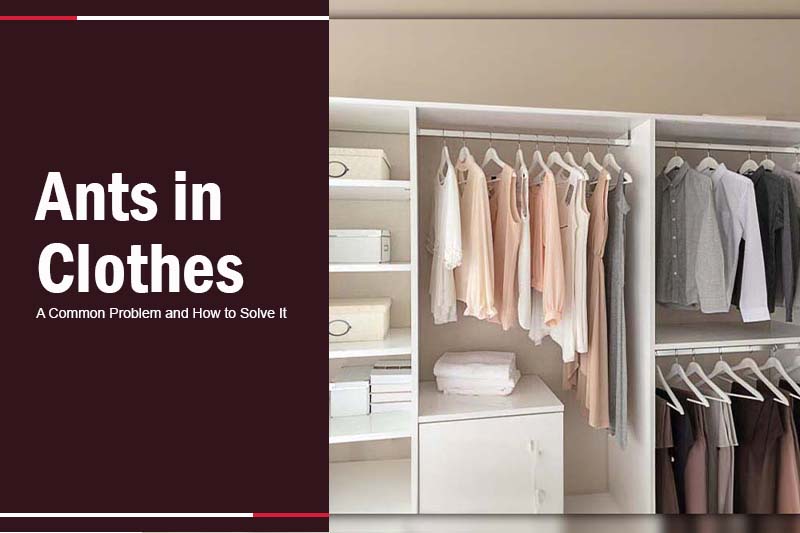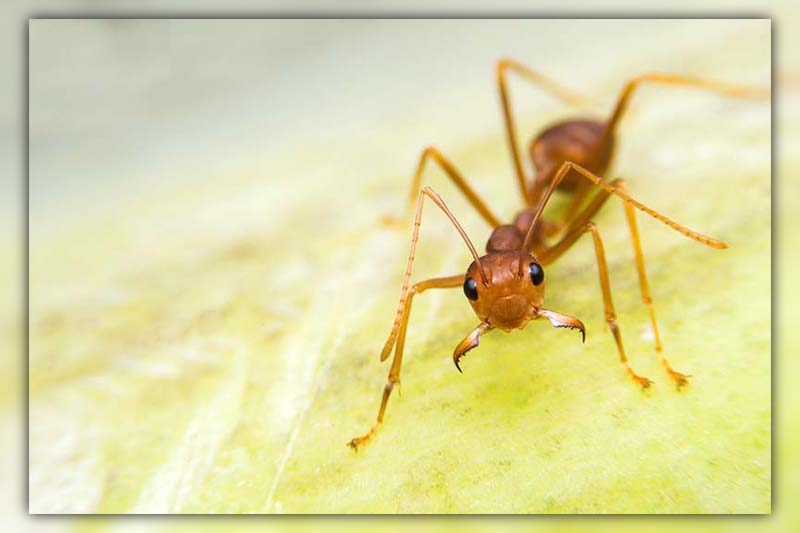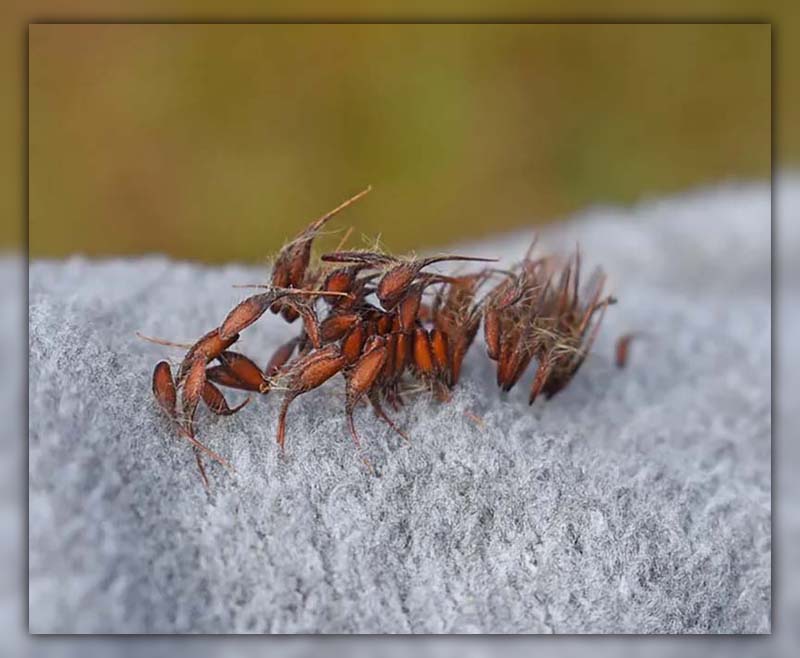Have you ever found ants in clothes or in your closet?
In this blog, you will learn the answer to the question “Ants in clothes?” and how to prevent and remove them from your garments.

How to Get rid of Ants in Clothes?
- An easy solution for ants in clothes is to check the type of stains before washing. Those with sticky food stains should be washed with the recommended heat and detergents. Sweaty ones should also be grouped according to their materials and washed thoroughly to remove the salty odor.
- Use ant repellents like lavender and peppermint in the closet to keep ants away from clean clothes. Lavender will also leave your clothes with a good aroma that is refreshing. Some detergents contain a lavender scent that can help deter ants even after washing.
- Soapy water can kill ants, and rinsing your clothes properly after washing can also help keep any attractive odor away.
- A wet towel soaked in white vinegar can kill and repel ants when used to wipe the closet. Find where ants nest in the closet and wardrobes because they will keep coming back if you do not eliminate their source.
Never use strong toxic pesticides to get rid of ants in your clothes because they can irritate your skin once you put them on. Those should also not be used in the bedroom closets where bedding is stored because sleeping on them overnight may put you in great danger.
Why are there ants in My Clothes?
The main cause of ants in your dirty clothes is moisture built from sweaty fabrics that are folded and kept in an airtight laundry basket. Even though most laundry baskets are always ventilated, squeezing dirty clothes makes them stuffy.
Human sweat contains salt that most ants need. Ants that live away from the coastal areas have a high demand for salt because they do not find it easily. Those who live near the ocean have confessed that they do not have a problem with ants in their clothes compared to those who leave away.
However, ants are attracted to clean clothes that are not properly washed. Stains from sweet food can still produce a mild odor that ants can pick. They will crawl on the clothes while trying to trace the source. As a result, you will find them in your clothes after washing, and they will keep returning even if you remove them.
After storing your clothes, ensure that the wardrobes and the closest have a free airflow. During the hot seasons, ants will migrate to moist places, and your damp wardrobe can make good habitat. Poorly dried clothes can build moisture in the closet, which is a major ant attraction.

How to Protect Your Clothes from Ant Infestations?
- Regular Cleaning: Clean your wardrobe regularly. Wipe the shelves with a mild detergent and water at least once a month. This will not only keep the ants at bay but also prevent the build-up of dust and mold.
- Proper Storage: Make sure your clothes are fully dry before storing them in the closet. Storing damp clothes can attract ants due to the moisture.
- Immediate Cleaning of Soiled Clothes: Clothes that are stained with food or sweat should be cleaned immediately to avoid attracting ants.
- Use of Ant Deterrents: Use natural ant repellents like peppermint and lavender in your closet. These will deter ants from coming near your clothes and will also give your clothes a refreshing aroma.
Do Ants at Clothes?
Ants CANNOT eat clothes because there are no nutrients for them.
However, ants can eat holes in your clothes if they are sweaty. They will also nibble on soft fabric if they have food stains like meat stew on them. Fabric is not part of an ant’s diet and is only damaged because of the food or sweat it contains.
Dirty clothes can attract other bugs like roaches and moths, making holes in your clothes. Ants can feed on their young ones, and they will be attracted to your closet as a result. Several holes in your clothes are a sign of a moth infestation, which should be urgently controlled.
This means ants cannot crawl on clothes if they are free from moisture, salty sweat, and food stains. A moth infestation on your clothes can attract ants because they can feed on moths’ larvae. The moth’s larvae eat clothes as part of their diet. Lavender repels moths, which can be sprayed in the closet to deter them.
In some cases, roaches hide in dirty clothes and can also eat holes in them as they try to get food stains. Since ants are also attracted to the same stains, you may think that it is the ants destroying your clothes. Ants do not make big holes like moths do because their aim is not to eat the fabric.

Natural and Safe Ant Control Methods
Ants are an integral part of the ecosystem and play a significant role in it. Therefore, it is crucial to use methods to control ants that do not harm them and are also safe for humans and pets.
Utilize Natural Kitchen Ingredients
Several kitchen ingredients can be used as ant deterrents. They are safe, non-toxic, and easy to use. Here are a few methods:
- Vinegar: Spray a solution of equal parts vinegar and water around your closet and other ant-infested areas. Vinegar disrupts the scent trail of ants, preventing them from coming back.
- Cinnamon: Cinnamon, particularly cinnamon essential oil, can deter ants. Sprinkle ground cinnamon or place cinnamon sticks in areas where you have noticed ant activity.
- Boric Acid and Sugar: A mixture of boric acid and sugar can be used to control ant infestations. The sugar attracts the ants, and the boric acid kills them. However, be cautious while using boric acid as it can be harmful if ingested by humans or pets.
Natural Essential Oils
Essential oils have potent properties that can deter ants. Here are a few essential oils that can be used:
- Peppermint Oil: A mixture of peppermint oil and water can be sprayed around the closet and other ant-infested areas. Ants dislike the smell of peppermint, and hence, it works as an effective deterrent.
- Tea Tree Oil: Tea tree oil is a potent ant deterrent and can also kill ants. Mix a few drops of tea tree oil with water and spray it in areas where you see ants.
- Lemon or Orange Essential Oil: Citrus oils contain d-limonene, which is toxic to ants. Mix the citrus oil with water and spray it around your home and closet.
Remember, while using essential oils, make sure to dilute them with water as they can be strong and may cause skin irritation or other adverse effects if used in concentrated form. Also, test a small area first to ensure there are no adverse effects on the surfaces in your home.
Following these guidelines can help you manage and prevent ant infestations in your clothes and closets in a safe and natural way.

Ants on Clothesline
Outdoor ants can sometimes be seen crawling on cloth lines. This happens when the ground below is wet, or they cannot crawl on it for some reason. They will crawl up the support posts and crawl on the lines.
They do this by following each other’s trails after the worker ants have established a route.
If ants use your clothesline as a major route, they can easily end up on the clothes. Sometimes, they can easily wander off the mainline because the clothes will obstruct them. That does not mean the clothes are dirty, and there is no need to worry.
To get rid of ants from the clothesline, wipe the line with a damp towel soaked in soapy water to clear the ants’ trail. Ensure all the clothes are properly dried before you remove them outdoors. Then check the iron and fold each cloth before you keep them.
FAQs
How do Ants Make Holes in Clothes?
It may seem surprising, but ants don’t actually make holes in clothes, at least not for the purpose of feeding on the fabric. They lack the physical ability to chew through fabric like moths or other fabric-eating pests do.
However, they can cause indirect damage. If your clothes have food or sweat stains, ants may swarm the area, and their activity might lead to the fabric’s wear and tear, causing holes.
What Type of Ants Can Make Holes in Clothes?
The fire ant might indirectly cause holes in clothes. They are attracted to food stains or sweat on your garments and their constant activity might cause wear and tear in the fabric.
Conclusion
You have learned how to prevent and remove ants from your clothes and what causes them to infest your fabrics. Ants in clothes are a common problem that can be solved with some simple steps and natural remedies. You should always keep your clothes clean, dry, and sealed to avoid attracting ants.
If you want to learn more about how to deal with other pests, you can check out more blogs from Pestweek.

Calina Mabel has over 15 years of experience in the field of journalism and communications. Currently, Calina Mabel is the Content Writer for categories such as Cockroach, Ants, Bed Bugs, Mosquito, Rodent, Termite, and Flies on Pestweek.com. She aims to build content for these categories with a focus on providing valuable and accessible information to readers, in order to create the world’s largest knowledge community about Pests.
All content written by Calina Mabel has been reviewed by Emily Carter.

